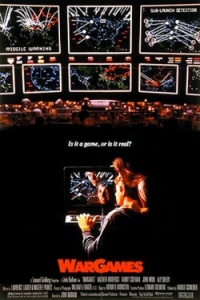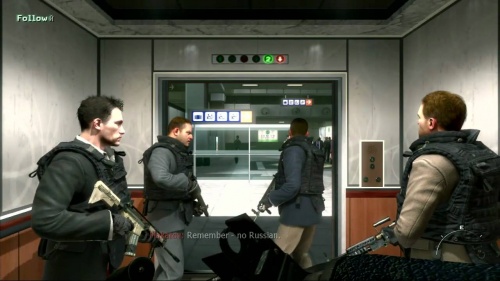Difference between revisions of "Banality of Simulated Evil"
m (1 revision) |
(→Ethics Discussion) |
||
| (37 intermediate revisions by 19 users not shown) | |||
| Line 1: | Line 1: | ||
| − | [[Image:Wargames.jpg|thumb| | + | [[Image:Wargames.jpg|thumb|200px|The problems associated with treating simulated evil like actual evil was demonstrated in the 1983 film |
| − | + | ||
| − | + | [[Wikipedia:War_Games_%28film%29|"War Games."]]]] | |
| − | [[ | + | '''"The Banality of Simulated Evil: Designing Ethical Gameplay"''' is a scholarly report written by [[Miguel Sicart]] in 2009. According to its abstract, the piece analyzes the ethical challenges of designing video games and [[Virtual Environment|virtual environments]].<ref>Sicart, Miguel. [https://link.springer.com/article/10.1007/s10676-009-9199-5 "The banality of simulated evil: designing ethical gameplay."] <i>Ethics and Information Technology.],</i> 11:191-202. 14 July 2009.</ref>. Sicart looks to address two main points in writing. First, he wants to address why video games present ethical challenges. Secondly, he wants to suggest ways in which ethics can be designed into video games. |
| − | + | ||
| − | + | ==Background== | |
| − | + | Sicart begins by summarizing [[Wikipedia:Banality of evil|a 1963 article in The New Yorker by Hannah Arendt]], which documents the trial of [[Wikipedia:Adolf Eichmann|Otto Adolf Eichmann]], a German government worker during the [[Wikipedia:Holocaust|Holocaust]] in Nazi Germany. Acting as a "cog within a vast machinery," Eichmann did not notice the consequences of his actions, focusing instead on the completion of tasks assigned to him. It is that separation of act and consequence that defines the banality of evil in Arendt's article. According to Sicart, "the Banality of Evil can be defined as a designed limitation of ethical agency in complex multi-agent, hierarchical systems." As such, Eichmann did not percieve himself as having a moral decision to make, and did not consider the end result of his actions. | |
| − | + | ||
| − | + | ||
| − | |||
| − | + | [[Image:Eichmann_on_trial.jpg|left|thumb|300px|Eichmann on trial]] | |
| − | + | ||
| − | + | ||
| − | + | ||
| − | + | ||
| − | + | Sicart then asked, "[a]re computer games systems of this kind?" His attempt at an answer focuses on popular violent and suggestively themed games such as [[Wikipedia:Defcon (video game)|Defcon]] and [[Grand Theft Auto IV]]. After analyzing these and other games and [[Virtual Environment|virtual environments]], violent and otherwise, he draws the following conclusions: | |
| − | [[ | + | * Games limit their players' ethical agency by isolating them from ethical judgments. Dependence or [[Trust]] for ethical judgement is placed on a closed system: the game. |
| − | Sicart, in the context of [[Information Ethics]], defines a video game to be an Information System and/or Infosphere constrained within design. The player is an agent | + | * Players' knowledge of the ethicality of their present and future actions are constrained to the limits of the game, which he casts as an [[Information Ethics#Infosphere|Infosphere]]. |
| + | * Players' positions on moral issues are still in play during the game. | ||
| + | |||
| + | Sicart, in the context of [[Information Ethics]], defines a video game to be an Information System and/or Infosphere constrained within design. The player is an agent among many within the game. Scripting, if any, manipulates the moral status in the game. Internal and external values play a critical role, as games tend to be based in reality. | ||
He defines two [[Information Ethics#Levels of Abstraction|Gradients of Abstraction]]: | He defines two [[Information Ethics#Levels of Abstraction|Gradients of Abstraction]]: | ||
| − | + | # Constrained to "direct interaction between agents and the state machine by means of game mechanics." (Procedural GoA) | |
| − | + | # "The game system as simulation and agents as ethical agents." (Semantic GoA) | |
Here, #2 is composed from #1, and all [[Information Ethics#Levels of Abstraction|Levels of Abstraction]] can then be viewed through these. | Here, #2 is composed from #1, and all [[Information Ethics#Levels of Abstraction|Levels of Abstraction]] can then be viewed through these. | ||
| − | == | + | ===Related Analysis=== |
| + | There have been many studies that have been conducted in order to discover the link between violent actions and violence in video games, and the majority have concluded that playing violent video games can increase a person's aggressive thoughts, feelings, and behavior <ref>Dang, Jimmy, Lee, Jin & Nguyen, Chau. [http://www.ethicapublishing.com/ethical/3CH12.pdf "Playing With Ethics: Video Game Controversy."] <i>Ethica Publishing: University of Colorado.</i> 22 May 2012.</ref>. These kinds of studies help to provide evidence for Sicart and are only one of the reasons that ethical design should be implemented into game play. There is also the ethical question of recreating situations and professions in various games that involve death, such as any game oriented around military endeavors. The reality of the situation is that "Families lose fathers, sons and brothers" everyday and yet "more and more developers have decided that these conflicts should be recreated for us to ‘enjoy’ in our living rooms". These practices are ethically questionable and provide ample reason for Sigart's claim that games need to be made with ethical implications in mind. | ||
| − | + | == Ethics Discussion == | |
| + | Brought up earlier, there are many issues that can arise from agents playing ethical and overly violent games. None is more evident as a story mission from the popular game, Call of Duty: Modern Warfare 2. In this mission, which is titled "[https://en.wikipedia.org/wiki/No_Russian No Russian]" because you are not to speak Russian for whatever reason, is simply you and a bunch of thugs go into an airport and just begin shooting every civilian in sight. In the context of the story, you are trying to convince the Russian terrorist, Makarov, that can be trusted. Despite doing what he acts, he knows that you are an undercover CIA agent and leaves you for dead. There exist inherent ethical dilemmas that Sigart is addressing throughout the "Banality of Simulated Evil", but to understand just how impactful it was, an understanding of what sentiment towards "No Russian" is. | ||
| + | [[File:No_Russian.jpg|500px|left|]] | ||
| + | On one of Vice's blogging sites, Waypoint, Ed Smith argues that this level has no need to exist in terms of completing the game<ref>Smith, Ed. “There’s No Reason for 'No Russian' to Exist in ‘Modern Warfare 2.’” Waypoint, Vice, 4 May 2017, waypoint.vice.com/en_us/article/4x44yp/theres-no-reason-for-no-russian-to-exist-in-modern-warfare-2.</ref>. He, along with many others, argue that the level is loosely based off of a terrorist attack in Mumbai in 2008, where a gunman open fired on a coffee shop, hotel, and a train station. Seeded, whether true or not, in an act of hate has it ethical implications because it is disrespectful to all those who have been killed in such acts. Another reason why he argues that it shouldn't exist is because it was simply a marketing scheme and anybody can skip the level if they so choose with no penalty. It is clear that violent things sell, but a game already about war may cross a line when it now involves the killing of civilians. | ||
| − | + | As Sigart argued, the events of "No Russian" feel like they aren't severe and most players opt-in for playing rather than passing because players ethical lenses tend to be less used when playing video games. Players know its bad and have seen similar events on the news, but there is a fact about that draws you in and makes you want to play and throw all ethical wind to the air. Not every player is going to play and feel like this is something that they could do, but it only takes one agent to solidify peoples ill feelings towards "No Russian". | |
| − | + | ==Recommendations== | |
| − | + | Sicart ends his report by laying out his five criteria for ethical gameplay design: | |
| − | + | #"Create an ethically relevant game world." | |
| − | + | #"Do not quantize your player's actions: let them live in a world that reacts to their values." | |
| − | + | #"Exploit the tension of being an ethical player." | |
| + | #"Insert other agents with constructivist capacities and possibilities." | ||
| + | #"Challenge the poietic capacities of players, by expanding or constraining them." | ||
| + | Sicart argues that designers should consider using these principles specifically in terms of Levels of Abstraction. This translates to (1) creating a game world where ethics are important; (2) designing a game world to respond to player's moral actions; (3) presenting challenging ethical situations for the player; (4) allowing the player to enact their own ethics; and (5) giving the player more power or less power in making moral choices. | ||
| + | {{resource| | ||
==See Also== | ==See Also== | ||
* [["Human out of the Loop" Military Systems]] | * [["Human out of the Loop" Military Systems]] | ||
| Line 47: | Line 49: | ||
* [[Miguel Sicart]] | * [[Miguel Sicart]] | ||
* [[Trust]] | * [[Trust]] | ||
| − | + | }} | |
| − | ==External | + | {{resource| |
| + | ==External Sources== | ||
* [https://ctools.umich.edu/access/content/group/aaaaaee7-1694-481e-95b6-090bdec54ec2/Required%20Readings/3%20Virtual%20Environments/Sicart%20Banality%20of%20Simulated%20Evil%202009.pdf Banality of Simulated Evil by Miguel Sicart] | * [https://ctools.umich.edu/access/content/group/aaaaaee7-1694-481e-95b6-090bdec54ec2/Required%20Readings/3%20Virtual%20Environments/Sicart%20Banality%20of%20Simulated%20Evil%202009.pdf Banality of Simulated Evil by Miguel Sicart] | ||
* [http://www.psychiatrictimes.com/display/article/10168/1325936 Coping with Obscene Phone Calls] | * [http://www.psychiatrictimes.com/display/article/10168/1325936 Coping with Obscene Phone Calls] | ||
| − | * [ | + | * [[Wikipedia:Drone_attacks_in_Pakistan|Drone Attacks in Pakistan]] |
| − | + | * [[Wikipedia:Kevin_Mitnick|Kevin Mitnick]] | |
| − | * [ | + | * [[Wikipedia:Operation_Sundevil|Operation Sundevil]] |
| − | * [ | + | * [[Wikipedia:Adolf_Eichmann|Otto Adolf Eichmann]] |
| − | * [ | + | * [[Wikipedia:Phreaking|Phreaking]] |
| − | * [ | + | * [[Wikipedia:Banality_of_evil|Summary of the 1963 "Banality of Evil" article by Hannah Arendt via Wikipedia]] |
| − | + | }} | |
| − | * [ | + | |
| − | + | ==References== | |
| + | <references/> | ||
| + | |||
| + | [[Category: Computer Simulation]] | ||
| + | [[category: Information Ethics]] | ||
| + | |||
| + | ([[Topics|back to index]]) | ||
Latest revision as of 13:25, 23 April 2019

"The Banality of Simulated Evil: Designing Ethical Gameplay" is a scholarly report written by Miguel Sicart in 2009. According to its abstract, the piece analyzes the ethical challenges of designing video games and virtual environments.[1]. Sicart looks to address two main points in writing. First, he wants to address why video games present ethical challenges. Secondly, he wants to suggest ways in which ethics can be designed into video games.
Contents
Background
Sicart begins by summarizing a 1963 article in The New Yorker by Hannah Arendt, which documents the trial of Otto Adolf Eichmann, a German government worker during the Holocaust in Nazi Germany. Acting as a "cog within a vast machinery," Eichmann did not notice the consequences of his actions, focusing instead on the completion of tasks assigned to him. It is that separation of act and consequence that defines the banality of evil in Arendt's article. According to Sicart, "the Banality of Evil can be defined as a designed limitation of ethical agency in complex multi-agent, hierarchical systems." As such, Eichmann did not percieve himself as having a moral decision to make, and did not consider the end result of his actions.
Sicart then asked, "[a]re computer games systems of this kind?" His attempt at an answer focuses on popular violent and suggestively themed games such as Defcon and Grand Theft Auto IV. After analyzing these and other games and virtual environments, violent and otherwise, he draws the following conclusions:
- Games limit their players' ethical agency by isolating them from ethical judgments. Dependence or Trust for ethical judgement is placed on a closed system: the game.
- Players' knowledge of the ethicality of their present and future actions are constrained to the limits of the game, which he casts as an Infosphere.
- Players' positions on moral issues are still in play during the game.
Sicart, in the context of Information Ethics, defines a video game to be an Information System and/or Infosphere constrained within design. The player is an agent among many within the game. Scripting, if any, manipulates the moral status in the game. Internal and external values play a critical role, as games tend to be based in reality.
He defines two Gradients of Abstraction:
- Constrained to "direct interaction between agents and the state machine by means of game mechanics." (Procedural GoA)
- "The game system as simulation and agents as ethical agents." (Semantic GoA)
Here, #2 is composed from #1, and all Levels of Abstraction can then be viewed through these.
Related Analysis
There have been many studies that have been conducted in order to discover the link between violent actions and violence in video games, and the majority have concluded that playing violent video games can increase a person's aggressive thoughts, feelings, and behavior [2]. These kinds of studies help to provide evidence for Sicart and are only one of the reasons that ethical design should be implemented into game play. There is also the ethical question of recreating situations and professions in various games that involve death, such as any game oriented around military endeavors. The reality of the situation is that "Families lose fathers, sons and brothers" everyday and yet "more and more developers have decided that these conflicts should be recreated for us to ‘enjoy’ in our living rooms". These practices are ethically questionable and provide ample reason for Sigart's claim that games need to be made with ethical implications in mind.
Ethics Discussion
Brought up earlier, there are many issues that can arise from agents playing ethical and overly violent games. None is more evident as a story mission from the popular game, Call of Duty: Modern Warfare 2. In this mission, which is titled "No Russian" because you are not to speak Russian for whatever reason, is simply you and a bunch of thugs go into an airport and just begin shooting every civilian in sight. In the context of the story, you are trying to convince the Russian terrorist, Makarov, that can be trusted. Despite doing what he acts, he knows that you are an undercover CIA agent and leaves you for dead. There exist inherent ethical dilemmas that Sigart is addressing throughout the "Banality of Simulated Evil", but to understand just how impactful it was, an understanding of what sentiment towards "No Russian" is.
On one of Vice's blogging sites, Waypoint, Ed Smith argues that this level has no need to exist in terms of completing the game[3]. He, along with many others, argue that the level is loosely based off of a terrorist attack in Mumbai in 2008, where a gunman open fired on a coffee shop, hotel, and a train station. Seeded, whether true or not, in an act of hate has it ethical implications because it is disrespectful to all those who have been killed in such acts. Another reason why he argues that it shouldn't exist is because it was simply a marketing scheme and anybody can skip the level if they so choose with no penalty. It is clear that violent things sell, but a game already about war may cross a line when it now involves the killing of civilians.
As Sigart argued, the events of "No Russian" feel like they aren't severe and most players opt-in for playing rather than passing because players ethical lenses tend to be less used when playing video games. Players know its bad and have seen similar events on the news, but there is a fact about that draws you in and makes you want to play and throw all ethical wind to the air. Not every player is going to play and feel like this is something that they could do, but it only takes one agent to solidify peoples ill feelings towards "No Russian".
Recommendations
Sicart ends his report by laying out his five criteria for ethical gameplay design:
- "Create an ethically relevant game world."
- "Do not quantize your player's actions: let them live in a world that reacts to their values."
- "Exploit the tension of being an ethical player."
- "Insert other agents with constructivist capacities and possibilities."
- "Challenge the poietic capacities of players, by expanding or constraining them."
Sicart argues that designers should consider using these principles specifically in terms of Levels of Abstraction. This translates to (1) creating a game world where ethics are important; (2) designing a game world to respond to player's moral actions; (3) presenting challenging ethical situations for the player; (4) allowing the player to enact their own ethics; and (5) giving the player more power or less power in making moral choices.
External Sources
References
- ↑ Sicart, Miguel. "The banality of simulated evil: designing ethical gameplay." Ethics and Information Technology.], 11:191-202. 14 July 2009.
- ↑ Dang, Jimmy, Lee, Jin & Nguyen, Chau. "Playing With Ethics: Video Game Controversy." Ethica Publishing: University of Colorado. 22 May 2012.
- ↑ Smith, Ed. “There’s No Reason for 'No Russian' to Exist in ‘Modern Warfare 2.’” Waypoint, Vice, 4 May 2017, waypoint.vice.com/en_us/article/4x44yp/theres-no-reason-for-no-russian-to-exist-in-modern-warfare-2.

